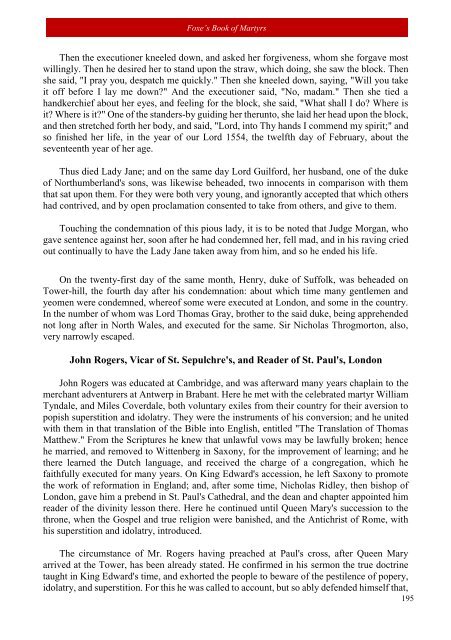Foxe - The Book of Martyrs
The mystery of history is not completely dark, since it is a veil which only partially conceals the creative activity and spiritual forces and the operation of spiritual laws. It is commonplace to say that the blood of the martyrs is the seed of the Church yet what we are asserting is simply that individual acts of spiritual decision bear social fruit …For the great cultural changes and historic revolutions that decide the fate of nations or the character of an age is the cumulative result of a number of spiritual decisions … the faith and insight, or the refusal and blindness, of individuals. No one can put his finger on the ultimate spiritual act that tilts the balance, and makes the external order of society assume a new form… Persecution, powerless to destroy or even to shake this new community, made it only the more sensible of its own strength, and pressed it into a more compact body.
The mystery of history is not completely dark, since it is a veil which only partially conceals the creative activity and spiritual forces and the operation of spiritual laws. It is commonplace to say that the blood of the martyrs is the seed of the Church yet what we are asserting is simply that individual acts of spiritual decision bear social fruit …For the great cultural changes and historic revolutions that decide the fate of nations or the character of an age is the cumulative result of a number of spiritual decisions … the faith and insight, or the refusal and blindness, of individuals. No one can put his finger on the ultimate spiritual act that tilts the balance, and makes the external order of society assume a new form… Persecution, powerless to destroy or even to shake this new community, made it only the more sensible of its own strength, and pressed it into a more compact body.
Create successful ePaper yourself
Turn your PDF publications into a flip-book with our unique Google optimized e-Paper software.
<strong>Foxe</strong>’s <strong>Book</strong> <strong>of</strong> <strong>Martyrs</strong><br />
<strong>The</strong>n the executioner kneeled down, and asked her forgiveness, whom she forgave most<br />
willingly. <strong>The</strong>n he desired her to stand upon the straw, which doing, she saw the block. <strong>The</strong>n<br />
she said, "I pray you, despatch me quickly." <strong>The</strong>n she kneeled down, saying, "Will you take<br />
it <strong>of</strong>f before I lay me down?" And the executioner said, "No, madam." <strong>The</strong>n she tied a<br />
handkerchief about her eyes, and feeling for the block, she said, "What shall I do? Where is<br />
it? Where is it?" One <strong>of</strong> the standers-by guiding her therunto, she laid her head upon the block,<br />
and then stretched forth her body, and said, "Lord, into Thy hands I commend my spirit;" and<br />
so finished her life, in the year <strong>of</strong> our Lord 1554, the twelfth day <strong>of</strong> February, about the<br />
seventeenth year <strong>of</strong> her age.<br />
Thus died Lady Jane; and on the same day Lord Guilford, her husband, one <strong>of</strong> the duke<br />
<strong>of</strong> Northumberland's sons, was likewise beheaded, two innocents in comparison with them<br />
that sat upon them. For they were both very young, and ignorantly accepted that which others<br />
had contrived, and by open proclamation consented to take from others, and give to them.<br />
Touching the condemnation <strong>of</strong> this pious lady, it is to be noted that Judge Morgan, who<br />
gave sentence against her, soon after he had condemned her, fell mad, and in his raving cried<br />
out continually to have the Lady Jane taken away from him, and so he ended his life.<br />
On the twenty-first day <strong>of</strong> the same month, Henry, duke <strong>of</strong> Suffolk, was beheaded on<br />
Tower-hill, the fourth day after his condemnation: about which time many gentlemen and<br />
yeomen were condemned, where<strong>of</strong> some were executed at London, and some in the country.<br />
In the number <strong>of</strong> whom was Lord Thomas Gray, brother to the said duke, being apprehended<br />
not long after in North Wales, and executed for the same. Sir Nicholas Throgmorton, also,<br />
very narrowly escaped.<br />
John Rogers, Vicar <strong>of</strong> St. Sepulchre's, and Reader <strong>of</strong> St. Paul's, London<br />
John Rogers was educated at Cambridge, and was afterward many years chaplain to the<br />
merchant adventurers at Antwerp in Brabant. Here he met with the celebrated martyr William<br />
Tyndale, and Miles Coverdale, both voluntary exiles from their country for their aversion to<br />
popish superstition and idolatry. <strong>The</strong>y were the instruments <strong>of</strong> his conversion; and he united<br />
with them in that translation <strong>of</strong> the Bible into English, entitled "<strong>The</strong> Translation <strong>of</strong> Thomas<br />
Matthew." From the Scriptures he knew that unlawful vows may be lawfully broken; hence<br />
he married, and removed to Wittenberg in Saxony, for the improvement <strong>of</strong> learning; and he<br />
there learned the Dutch language, and received the charge <strong>of</strong> a congregation, which he<br />
faithfully executed for many years. On King Edward's accession, he left Saxony to promote<br />
the work <strong>of</strong> reformation in England; and, after some time, Nicholas Ridley, then bishop <strong>of</strong><br />
London, gave him a prebend in St. Paul's Cathedral, and the dean and chapter appointed him<br />
reader <strong>of</strong> the divinity lesson there. Here he continued until Queen Mary's succession to the<br />
throne, when the Gospel and true religion were banished, and the Antichrist <strong>of</strong> Rome, with<br />
his superstition and idolatry, introduced.<br />
<strong>The</strong> circumstance <strong>of</strong> Mr. Rogers having preached at Paul's cross, after Queen Mary<br />
arrived at the Tower, has been already stated. He confirmed in his sermon the true doctrine<br />
taught in King Edward's time, and exhorted the people to beware <strong>of</strong> the pestilence <strong>of</strong> popery,<br />
idolatry, and superstition. For this he was called to account, but so ably defended himself that,<br />
195


















